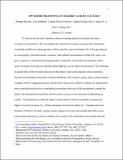Files in this item
Ownership reasoning in children across cultures
Item metadata
| dc.contributor.author | Rochat, Philippe | |
| dc.contributor.author | Robbins, Erin | |
| dc.contributor.author | Passos-Ferreira, Claudia | |
| dc.contributor.author | Donato Oliva, Angela | |
| dc.contributor.author | Dias, Maria D.G. | |
| dc.contributor.author | Guo, Liping | |
| dc.date.accessioned | 2018-01-15T12:30:14Z | |
| dc.date.available | 2018-01-15T12:30:14Z | |
| dc.date.issued | 2014-09 | |
| dc.identifier | 252067310 | |
| dc.identifier | 0bc9410c-3d5b-4210-b2a8-9235d0251a8e | |
| dc.identifier | 84902686871 | |
| dc.identifier.citation | Rochat , P , Robbins , E , Passos-Ferreira , C , Donato Oliva , A , Dias , M D G & Guo , L 2014 , ' Ownership reasoning in children across cultures ' , Cognition , vol. 132 , no. 3 , pp. 471-484 . https://doi.org/10.1016/j.cognition.2014.04.014 | en |
| dc.identifier.issn | 0010-0277 | |
| dc.identifier.other | ORCID: /0000-0003-0404-453X/work/65014381 | |
| dc.identifier.uri | https://hdl.handle.net/10023/12477 | |
| dc.description.abstract | To what extent do early intuitions about ownership depend on cultural and socio-economic circumstances? We investigated the question by testing reasoning about third party ownership conflicts in various groups of three- and five-year-old children (N=176), growing up in seven highly contrasted social, economic, and cultural circumstances (urban rich, poor, very poor, rural poor, and traditional) spanning three continents. Each child was presented with a series of scripts involving two identical dolls fighting over an object of possession. The child had to decide who of the two dolls should own the object. Each script enacted various potential reasons for attributing ownership: creation, familiarity, first contact, equity, plus a control/neutral condition with no suggested reasons. Results show that across cultures, children are significantly more consistent and decisive in attributing ownership when one of the protagonists created the object. Development between three and five years is more or less pronounced depending on culture. The propensity to split the object in equal halves whenever possible was generally higher at certain locations (i.e., China) and quasi-inexistent in others (i.e., Vanuatu and street children of Recife). Overall, creation reasons appear to be more primordial and stable across cultures than familiarity, relative wealth or first contact. This trend does not correlate with the passing of false belief theory of mind. | |
| dc.format.extent | 1092818 | |
| dc.language.iso | eng | |
| dc.relation.ispartof | Cognition | en |
| dc.subject | Ownership | en |
| dc.subject | Reasoning | en |
| dc.subject | Children | en |
| dc.subject | Development | en |
| dc.subject | Culture | en |
| dc.subject | BF Psychology | en |
| dc.subject | BDC | en |
| dc.subject | R2C | en |
| dc.subject.lcc | BF | en |
| dc.title | Ownership reasoning in children across cultures | en |
| dc.type | Journal article | en |
| dc.contributor.institution | University of St Andrews. School of Psychology and Neuroscience | en |
| dc.contributor.institution | University of St Andrews. Centre for Social Learning & Cognitive Evolution | en |
| dc.identifier.doi | 10.1016/j.cognition.2014.04.014 | |
| dc.description.status | Peer reviewed | en |
This item appears in the following Collection(s)
Items in the St Andrews Research Repository are protected by copyright, with all rights reserved, unless otherwise indicated.

